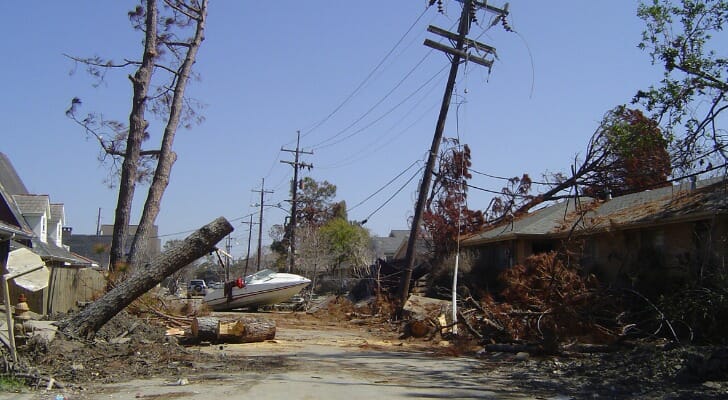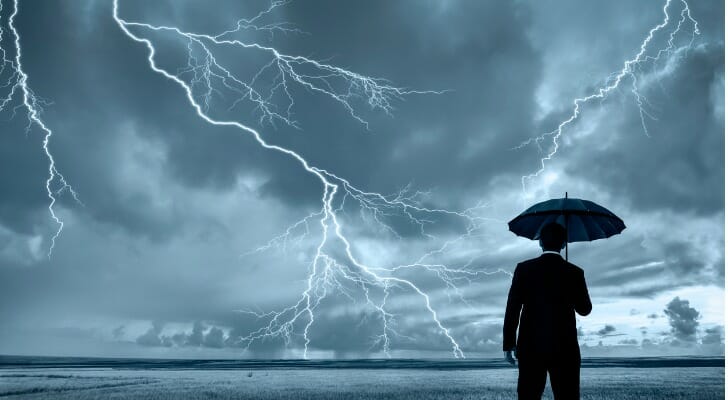An economic shock, or macroeconomic shock, refers to any sudden, large-scale event that disrupts the economy unexpectedly. While not all economists agree, many believe that for an event to qualify as a shock, it must be “exogenous.” This means it originates from outside the economy rather than emerging from internal economic conditions. Let’s break down what qualifies as an economic shock, explore different types and look at some notable historical examples.
A financial advisor can help adjust your financial plan to protect your investments from economic shocks.
What Is an Economic Shock?
While there isn’t an absolute consensus among scholars about the definition of an economic shock, there are four features that commonly are understood to define an economic shock.
Singular or Short-Term Event
An economic shock is a single or short-term event. By its nature, this event breeds instability because it results in either costs or gains that have not been priced into the market. Long-term trends aren’t considered economic shocks because the economy has time to adjust. For example, an industry disappearing overnight would be considered a shock, while an industry fading out over several decades would not.
Large-Scale
By large-scale, economists mean that the event has to affect the entire economy or close to it. Individual industries or geographic areas can suffer local or regional economic shocks, but the more local the event is the less likely it is to meet the definition. Events that affect only a certain group of people, such as those hit by the Bernie Madoff scandal, are more likely to be considered “financial shocks,” meaning an event which affects the personal finances of individuals rather than the economy at large.
Unexpected
An economic shock is an event that was neither planned nor foreseen. As a result, it causes unexpected changes to the economy. Anticipated events, such as demographic trends, are generally priced into the marketplace. Consumers, businesses and investors spend according to what they know is coming. Unanticipated events, by definition, are not. They catch the market by surprise and, as a result, have unpredictable consequences.
Exogenous
Many – but not all – economists argue that an economic shock must come from outside the economy, in other words, be exogenous. Something like weather, political upheaval or war would meet this definition. By this logic, however, an event like the 2008 financial crisis would not necessarily be considered an economic shock since the crisis arose from within the economy, namely, a series of financial decisions. This has led some economists to argue that an economic shock doesn’t need to be exogenous.
Types of Economic Shocks

There are many types of economic shocks, all depending on what happens and how widespread its effects are. A few of the main forms to look for are:
Macro
A macroeconomic shock is one that affects an economy at either a multinational or global scale. Given the highly interconnected nature of modern financial markets, a growing number of events can have macroeconomic impact. For example, any significant increase in the price of oil can create a macroeconomic shock on a global scale by increasing the price to transport, produce and use most products.
Supply Side
Supply-side economic shocks occur when it suddenly becomes significantly more expensive or difficult to produce goods and services in one or more sectors of the economy. Weather events are a classic supply-side economic shock. If a storm or other natural disaster cuts off access to raw materials, it gets much more difficult for a business to produce goods based on that product.
Demand
Demand-side economic shocks, which are among the most common types of economic shocks, occur when consumers change their spending patterns sharply and significantly. A weak job market is the classic demand-side economic shock. If an event causes massive layoffs or a downturn in the stock market, consumers may slash spending, triggering a negative feedback loop of businesses losing money, leading to more layoffs and a further cut in consumption.
Downward or Upward
Downward economic shocks are events that hurt the economy, causing lost value, slower production and layoffs. They are the chief cause of recessions, and as a result downward shocks get most of the attention. Upward economic shocks help the economy. These are unanticipated events that create value, boost productivity, create new jobs in new industries or otherwise help make the economy stronger in some significant way.
Examples of Economic Shocks
Economic shocks can come from many different sectors. Some of the most common, however, are:
Weather and Natural Disasters
Weather and natural disasters can cause both downward and upward economic shocks. A drought in Australia followed by widespread bushfires in eastern Australia will cost the nation billions. One economist estimates the cost of recovery will be close to $100 billion.
Technology
A technological shock comes from any area that relies on technology in some way. Often this includes energy production and prices or communications. However, a technology shock can also refer to new developments that meaningfully change productivity or industries. A new invention, if its impact is large enough, is considered an economic shock, either upward or downward depending on its actual impact. Henry Ford’s development of assembly line manufacturing, for example, is considered an upward economic shock.
Politics
A political economic shock comes from state or non-state actors and is sometimes based on politically motivated actions. Most often this comes from public policy. For example, a significant change to the Federal Reserve’s interest rate could cause a political economic shock, as this would affect the economy as a whole based on a policy decision. More disruptively, geopolitical events such as war and terrorism, or a trade war, are also considered political shocks, as they can cause economic chaos based on politically motivated acts.
Bottom Line

An external shock is an unexpected event that dramatically changes an entire economy’s direction, either upward (value gains and job creation) or downward (value lost and job destruction). Depending on one’s views, the cause of an economic shock can also come from within an economy.
Tips for Responding to Shocks
- A financial advisor can use smart diversification strategies to protect your portfolio from the risk of a downward economic shock. SmartAsset’s free tool matches you with up to three vetted financial advisors who serve your area, and you can interview your advisor matches at no cost to decide which one is right for you. If you’re ready to find an advisor who can help you achieve your financial goals, get started now.
- A downward economic shock does not necessarily mean you should pull entirely out of the market. When things go south, you actually have a number of options. The same goes for market trends: securities moving in a consistent direction open specific opportunities.
Photo credit: ©iStock.com/guvendemir, ©iStock.com/alphaspirit, ©iStock.com/gkgraphics
